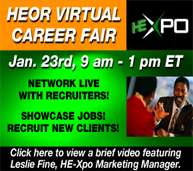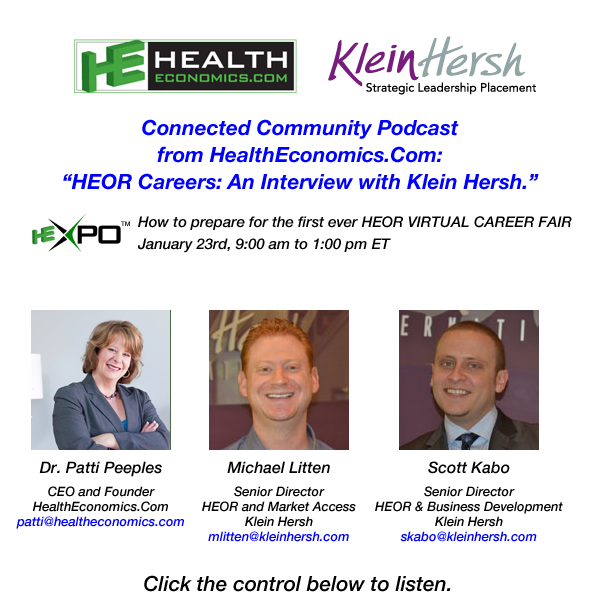Preparing for a Virtual Career Fair in Health Economics & Outcomes Research (HEOR)
January 16, 2014
Do you wonder what is going on within the job market for pharmaceutical Health Economics and Outcomes Research (HEOR), and Pricing, Reimbursement, Market Access (PRMA) from either a job-seeker’s perspective or a hiring manager’s viewpoint? Do you wonder how best to prepare for a Career Fair? To answer those questions, I interviewed Michael Litten and Scott Kabo of Klein Hersh (KH), a strategic leadership placement organization with a division focused on HEOR, PRMA, and the fast-growing Data Analytics and Informatics areas. Listen to the Podcast here, as part of our HealthEconomics.Com CONNECTED COMMUNITY Podcast Series. This blog posting is a summary of the Podcast.
On January 23, 2014, HealthEconomics.Com is hosting the first ever virtual Career Fair focused on HEOR, PRMA, and Data Analytics in HE-Xpo, a virtual on-line tradeshow and marketplace. Pre-register here for this event, and to be informed about other virtual HEOR-focused educational conferences and events. On January 23rd, between 9am-1pm, log-in from your computer, tablet or smartphone, and see what is in store for your career in 2014! You’ll be able to visit the Exhibit Hall and interact LIVE with exhibitors (pharmaceutical companies, consulting organizations, universities, CROs, and more), as well as visit the Learning Center to get Job Search tips. Spend time in the Lounge to network with others one-on-one and to connect to all those companies via social media! It’s a truly unique experience, and accessible to everyone, whether your are checking in from your home, office, or even in an airplane!
Let’s get started on our interview with Mike and Scott of Klein Hersh Recruiting.
[Patti] At the January 23rd Virtual HEOR Career Fair, we have many companies who are recruiting, including Boehringer Ingelheim, Covance, Evidera, Carrot Pharma, Klein Hersh, University of Florida, Thomas Jefferson University, PRMA, and more. What three pieces of advice do you offer to a Job Seeker as they prepare for a Career Fair?
[KH] In every job search, job seekers should focus on:
1. Preparation;
2. Due Diligence; and,
3. Creating an agenda with goals to accomplish during the Career Fair.
It is important to know the specific companies that will be present at the Career Fair, and in advance of the event, research the job openings and the individual position description. Know what company and job you will visit first, second, and so on. It is recommended that the candidate prepare a specific script targeted toward each job, explaining why he/she would be a great fit for that advertised position and the company as a whole. Kabo emphasizes that the candidate should be strategic in their efforts during the career fair, and if they aren’t sure what the company is looking for, to be prepared with “qualifying questions” that help elicit specific traits, skills, and experience that the company desires in the person who will fill that role. He suggests conducting due diligence on the company by searching the corporate website, reviewing press releases and announcements, and familiarizing oneself with the product portfolio and strategic focus. “The art of an interview is your ability to ask questions and engage in dialogue,” emphasizes Kabo. Moreover, even at a virtual career fair, all candidates should come to the interview prepared with a list of questions that help him or her understand the company, its culture, the specific role, and the skills necessary to succeed.
[Patti] How should an Employer prepare for a Career Fair?
[KH] Michael Litten notes that some of same advice given to candidates embarking on a Career Fair also applies to employers: namely, Preparation, Preparation, Preparation. Employers should be fully capable of discussing the corporate goals, areas of focus, and uniqueness. They should also be prepared to field common questions that candidates in the field of HEOR would ask about the specific job. Interviewing goes both ways, particularly in high-demand areas like HEOR and Pricing, Reimbursement, and Market Access. All human resources personnel should know what makes their company “sizzle” and be prepared for delivering a pitch that would make someone want to make the leap from their present company to a new place of employment.
[Patti] This is a virtual Career Fair. How should employers and job seekers specifically prepare for this on-line experience?
[KH] In terms of the upcoming Virtual Career Fair on January 23, Litten and Kabo encourage everyone to participate because – as they say – there really are no barriers to one attending in terms of location, travel, cost, etc. This Virtual Career Fair for Health Economics & Outcomes Research is incredibly unique and a fantastic idea. There are, however, a few things both a candidate and an employer should remember about this on-line experience. Litten believes that the virtual experience has some commonalities with a telephone interview. Both the employer and the candidate should be prepared to quickly and efficiently steer the conversation toward a specific role and to be able to say a few words that highlight the skill set needed or that the candidate possesses, up front. Because this is a virtual environment typing this information, so be prepared for this. Also, be ready to migrate through the Exhibit Hall to visit as many companies as possible, and make sure to get individual follow-up information with email addresses so you can establish that relationship outside of the Career Fair.
[Patti] What is the most common mistake you have observed in the interviewing process?
[KH] Litten notes that time delays, including drawn-out scheduling and/or decision-making in the job search process by the hiring company, is the biggest challenge to both the employer and the job seeker. If the process goes stagnant, the candidate will move onto another opportunity. Klein Hersh establishes deep relationships with both the hiring company and the candidates and seeks for transparency on behalf of both parties, in terms of interest in the candidate or interest in taking the position. Occasionally, a candidate may be uncomfortable stating that they are not interested in a position, but ultimately, this honesty works best for all parties involved. Additionally, it is important that the company clearly state if they desire a specific type of skill set. Likewise, the candidate needs to be transparent about what skills they possess and the areas in which they are less comfortable. Another common fallacy is for the candidate to play their cards “close to the vest”. Kabo notes that candidates should clearly communicate their enthusiasm for the position and the company, if it exists. The last thing one wants is for the company to have a debrief after an interview and note, “we really liked the candidate’s technical capabilities, but we just didn’t get the sense they were interested in us!” If you like each other, let it be known!
[Patti] How can a resume stand out in today’s marketplace?
[KH] Klein Hersh does a great deal of counseling on resume structure. The most essential thing to remember is that people are busy, so conciseness is essential. Your entire work career will likely not be reviewed job by job, bullet point by bullet point. Litten strongly suggests including an “Expertise or Overall Summary of Profile” statement at the top of the resume, including relevant skill sets and today’s buzzwords. He also notes that, in today’s environment, it is increasingly common for candidates to hold a series of short-term consulting jobs, often moving from one company to another in short-term contract positions. If this is the case, it is essential to note that these moves were intentional and part of an organized process of consulting, and to note this at the top of the resume. This immediately addresses the concern over the candidate being a “job-hopper”, and instead positions the candidate as someone who has chosen a particular tact to their career focused intentionally on short-term contracting positions. This is acceptable, but an explanation at the top of the resume should indicate this approach.
[Patti] In today’s marketplace, how is loyalty judged? What’s the shortest acceptable time to stay at a company, and what is a good duration in a job or with a company?
[KH] While it is uncommon in today’s marketplace to stay with a company for 25 years and receive that retirement party and a gold watch, it is important for individuals to have reasonable tenure in their positions. Litten suggests that 1 year is the minimum time in a job, and preferably two years. If an individual is with a company for 3-5 years, even better. But, as noted before, if an individual has held a series of multi-month or year-long contract positions, this is acceptable as long as it is explained within the resume.
[Patti] Do you have any closing thoughts on the Job Market for individuals in the healthcare value area?
[KH] This area of HEOR and PRMA, as well as Data Analytics, continues to be a fast-growing area. Make sure you, as a candidate, really know and understand the company where you are applying and be prepared to speak cogently about the organization’s mission and focus, the specific position, and what makes you stand out as that one great candidate for that particular job. From an employer’s perspective, the job market is tight and skilled candidates have many options. Be prepared to really sell the company as well as be able to speak to the commitment to the function of HEOR. Employers should describe the exciting future that the company can provide to the candidate. And lastly, it’s essential to be honest and transparent with each other and with your Executive Recruiter.
[Patti] Thank you to Michael Litten and Scott Kabo, Executive Recruiters with Klein Hersh, for their insights into the HEOR & PRMA Jobs Market. Klein Hersh will be exhibiting at the 1st-ever HEOR Virtual Career Fair in HE-Xpo, sponsored by HealthEconomics.Com, scheduled for Thursday, January 23, 2014, 9am-1pm ET. Pre-register here or, you can register on the day of the event with a few clicks at the same link. Log-on from your computer, tablet or smart-phone. If you are a hiring company and are interested in exhibiting or recruiting at the Career Fair, or participating in future HE-Xpo events, contact Leslie Fine, HE-Xpo Marketing Manager at leslie@blogsite.healtheconomics.com.
If your browser does not display the controls, download the podcast here.









